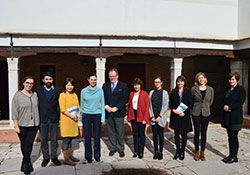New HEN reports on migration and health: towards a better understanding of health and migration in the WHO European Region

WHO
On 16–17 February 2016, the second Health Evidence Network (HEN) writing workshop in Venice, Italy was hosted by the WHO European Office for Investment for Health and Development and the Division of Information, Evidence, Research and Innovation.
The workshop brought together 2 HEN author groups:
- the University of Limerick, Ireland, working on the public health implications of different definitions of migrants
- the International Centre for Reproductive Health at Ghent University, Belgium, working on maternal health.
The workshop provided technical guidance to HEN authors on conducting an evidence synthesis and on writing for policy-makers, not their regular target audience. Issue-specific reports will be published on
- maternal health
- the public health aspects of the different definitions of migrants
- mental health.
Synopses of upcoming reports
In the WHO European Region, evidence shows that migrant women experience a higher risk of unintended pregnancies, pregnancy complications, sexually transmitted diseases, as well as sexual and domestic violence and female genital mutilation. Since their documentation status often differs from that of citizens, many migrant women find that their access to health services is restricted. This HEN report will review evidence on the reduction of inequalities in accessibility and quality of maternal health care for migrants in the Region, and formulate policy options to overcome those barriers and ultimately improve their health status.
Definitions of the term migrant and their application differ throughout the Region. A new HEN report will explore how these different definitions influence access to and delivery of health care for the different population groups and what policy options can be drawn from the evidence available.
Previous systematic reviews suggested that certain migrant groups, such as labour migrants and refugees, have higher rates of depression, anxiety, post-traumatic stress disorder and other mental illnesses. This report will provide a synthesis of evidence on policies and interventions to improve access to and delivery of mental health care services.
Previous HEN reports
The last 3 HEN evidence synthesis reports on migration and health reviewed the best available evidence in the Region about the access to and delivery of health care in different migrant groups:
- undocumented migrants
- labour migrants
- refugees and asylum seekers.



